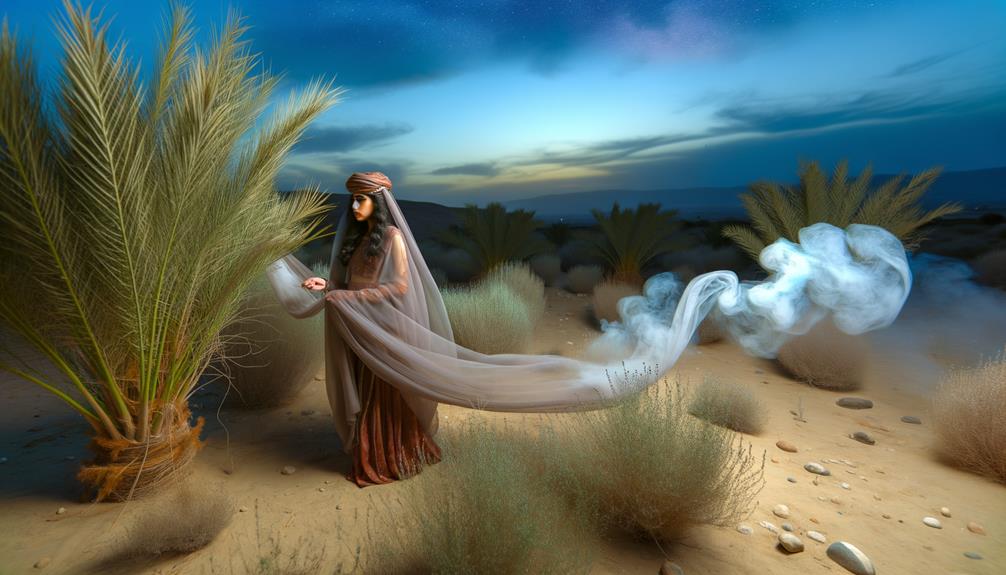Meaning of the Name Keturah
The name Keturah originates from Hebrew, meaning 'incense,' and carries profound biblical and cultural significance. Keturah is known as Abraham's second wife in Genesis 25:1-6, who bore six sons, thereby extending his lineage.
In Hebrew, her name symbolizes pleasantness and sanctity, often associated with aromatic substances used in religious rituals. Culturally, Keturah embodies values of purity, reverence, and moral integrity.
Her name resonates with themes of spiritual elevation and family devotion, making it a choice of historical depth and elegance. To uncover the broader implications of her story and name, further exploration is encouraged.

Key Takeaways
- Keturah means 'incense' or 'fragrance' in Hebrew.
- The name symbolizes pleasantness, sanctity, and spiritual elevation.
- Keturah was Abraham's second wife, mentioned in Genesis 25:1-6.
- She bore six sons, contributing to Abraham's lineage and associated with Arabian tribes.
- The name is tied to ritualistic and aromatic significance in ancient Israelite culture.
Biblical Roots
The name Keturah holds significant biblical roots, primarily derived from the Old Covenant where Keturah is mentioned as Abraham's second wife. The account of Keturah is found in Genesis 25:1-6, which describes her as giving birth to six sons, extending Abraham's lineage.
This union is generally considered post-Sarah's death and highlights an aspect of Abraham's life that is less frequently discussed. Keturah's role, though briefly mentioned, has implications for the genealogical and tribal narratives of the Bible. Her sons are often associated with various tribes in the Arabian Peninsula, contributing to the broader understanding of Abrahamic descendants.
Therefore, Keturah's biblical roots are pivotal in exploring the intricate tapestry of familial and tribal relationships in ancient texts.
Hebrew Origins
Examining the Hebrew origins of the name Keturah reveals its linguistic and cultural significance within the ancient Israelite context. Derived from the Hebrew word "קְטוּרָה" (Qetûrāh), the name Keturah is associated with the concept of incense or fragrance, symbolizing a sense of pleasantness and sanctity. This etymological connection underscores the importance of aromatic substances in religious rituals and daily life in ancient Israel.
| Hebrew Word | Transliteration | Meaning |
|---|---|---|
| קְטוּרָה | Qetûrāh | Incense |
| קטורת | Qetoret | Fragrance |
| קטר | Qatar | To burn incense |
| קטרת | Qetaret | Perfume |
This table illustrates the linguistic roots and related terms, emphasizing the name Keturah's deep ties to sensory and ritualistic elements in Hebrew culture.
Cultural Significance
Keturah's cultural significance extends beyond its etymological roots, embodying themes of purity, reverence, and a deep connection to ancient Israelite rituals and societal values.
In Jewish tradition, Keturah is recognized as Abraham's wife after Sarah's death, which underscores the name's association with continuity and legacy within the patriarchal lineage.
Her name, meaning 'incense' or 'fragrance,' symbolizes purity and spiritual elevation, integral to religious ceremonies and daily life in ancient Israel.
Moreover, Keturah's identity reflects the values of devotion and family, illustrating the importance of maintaining spiritual and moral integrity.
Her story and the meaning of her name encapsulate a profound reverence for tradition, underscoring the broader cultural and historical contexts of ancient Israelite society.
Linguistic Analysis
Building upon the cultural significance of Keturah, it is pertinent to analyze the linguistic roots and semantic nuances of her name to fully appreciate its historical and etymological dimensions.
The name Keturah, derived from the Hebrew קְטוּרָה (qetûrâ), meaning 'incense' or 'fragrance,' evokes imagery of aromatic offerings and sacred rituals. This etymology suggests a connotation of sanctity and reverence, aligning with the ancient Near Eastern traditions where incense was a symbol of divine presence. In the biblical context, the name Keturah is also associated with Abraham’s wife after the death of Sarah, signifying a sense of continuity and new beginnings. Similarly, the origin of the name Keegan is of Irish Gaelic descent, meaning ‘son of Egan’ and has connotations of strength and leadership. Both names carry rich cultural and historical significance, shaping the identity and character of those who bear them.
Additionally, the root קטר (qatar), meaning 'to smoke' or 'to burn,' further reinforces its association with ritualistic practices. Therefore, the linguistic analysis of Keturah not only highlights its phonetic beauty but also its deep cultural and religious resonance.
Modern Usage
In contemporary contexts, the name Keturah has experienced a revival, often chosen for its unique cultural heritage and its evocative association with ancient traditions.
This resurgence is evident in diverse cultural and social settings, where parents seek names that convey depth and historical significance. The name's biblical roots and its meaning, 'incense' or 'fragrance,' appeal to those desiring a connection to spiritual and aromatic imagery.
Keturah's phonetic elegance and rarity make it a distinctive choice among modern naming conventions. Its adoption reflects broader trends toward embracing names with rich etymological backgrounds, offering an alternative to more conventional names.
Essentially, Keturah serves as a bridge between the past and present, encapsulating timeless allure and contemporary relevance.
Conclusion
Ironically, the name Keturah, with its profound biblical roots, rich Hebrew origins, and deep cultural significance, is often overlooked in contemporary discourse.
Its linguistic complexity and historical resonance contrast sharply with its modern usage, where such depth is rarely acknowledged.
This oversight serves as a poignant reminder of how easily profound meanings can be eclipsed by the passage of time, revealing a paradox in the collective valuation of linguistic heritage in an era of rapid cultural evolution.






